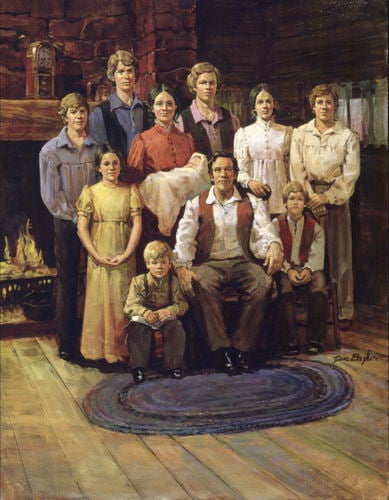
(I found this image in my computer files, but have no idea where it came from. I would happily give credit if I knew its source — and would like to know its source in any case.)
From one of my inchoate manuscripts:
Another indication of the Prophet’s sincerity is the striking fact that his own family manifestly believed him.[1] “The parents and all living brothers and sisters of Joseph Smith believed his account of his visions. In fact, the two grandparents still alive in 1830 also believed.”[2] For example, the Joseph Smith Sr., the Prophet’s father, traveled two hundred miles—a significant and taxing journey in the frontier America of that period—to carry a copy of the Book of Mormon to his own father, Asael Smith, the Prophet’s grandfather, not long before Asael’s death in 1830. On the basis of what he regarded as divine revelation, Asael had long anticipated that some member of his family would be “raised up” as a benefit to humankind. In his eighty-eighth year, he recognized Joseph as the fulfillment of his own revelation.[3] Joseph Smith Sr., as Oliver Huntington later recalled, “leaned and relied upon his son Joseph in all spiritual matters as much as boys generally do upon their parents for temporalities.”[4]
[1] “A prophet will always be held in honour,” said Jesus, with slight but realistic hyperbole, “except in his home town, and among his kinsmen and family” (Mark 6:4 [NEB]; compare Matthew 13:57; Luke 4:24; John 4:44).
[2] Anderson, Joseph Smith’s New England Heritage, xiv-xv.
[3] Anderson, Joseph Smith’s New England Heritage, 148-149; also Black, Stories from the Early Saints, 2, where further references are given.
[4]$ Andrus and Andrus, They Knew the Prophet, 71.
***
“The only way to build a peaceful community is to build men and women who are lovers and makers of peace.” (John Andreas Widtsoe [1872-1952], member of the Quorum of the Twelve Apostles)
***
I’ve always had a particular interest in this subject:
“Why Does the Book of Mormon Use the Phrase ‘Secret Combinations?'”
***
On 16 April 2015, the New York Times published an interview with one of the most significant living mathematical physicists, now approaching 94 years of age and retired after having long been associated with Princeton’s Institute for Advanced Studies. You might be interested to learn what one of his favorite books is:
***
I received this important communication from one of my anonymous critics at 7:03 PM on 15 November 2017:
“whine whine whine. baby-duffus-panniculus-shill.”
He’s sent me scores and scores of such essays over the past several years. Some of them have been obscene and some of them have been less complimentary, but I don’t think that he’s ever before been so eloquent or so cogent.
***
I enjoyed my participation today in the Wheatley Institution’s annual symposium “Reason for Hope: Responding to a Secular World,” along with former Relief Society general president Julie Beck, former BYU family studies professor Dr. Jenet Erickson, and retired BYU professor of philosophy C. Terry Warner. We each gave our separate presentations and then, at 3 PM, joined as a panel to take questions.
I’m told that the presentations will all be made available online at some point in the relatively near future. I didn’t see a camera working during the Q&A, though, so I doubt that it was recorded.
***
If you’ve ever been puzzled by the failure of the Kirtland Bank and whether or how Joseph Smith was involved in it, you’ll find this 42-minute interview with an expert historian of the episode — accessible via the website of the Interpreter Foundation — both interesting and helpful:
“The Kirtland Safety Society,” with Elizabeth Kuehn
***
The latest installment of my weekly column in the Deseret News:
“Inheriting wind — false accounts of the supposed war between science, religion”











